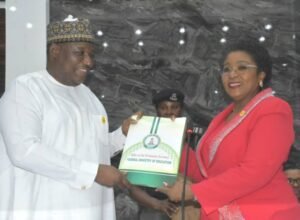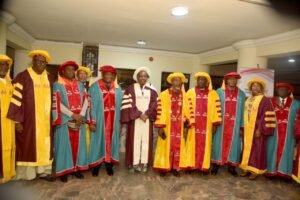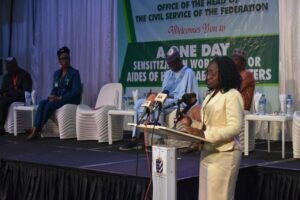
Catholic Secretariat calls for family empowerment to attend national development
By EricJames Ochigbo
The Catholic Secretariat of Nigeria (CSN) has called for family empowerment to boost the economy and curtail insecurity in the country.
Bishop Luka Gopep, the Episcopal Chairman of the Family and Life, a department of CSN, made the call at the Church and Society Annual General Meeting on Tuesday in Abuja.
The theme of the meeting is “Economic Empowerment and Capacity Strengthening for Self-Reliance and Community Resilience in Nigeria.”
He said that according to the National Bureau of Statistics, 133 million which represents 66.5 per cent of the country’s estimated 200 million population live in multidimensional poverty. (NBS 2022).
Gopep who is also the auxiliary bishop of Minna Diocese said that in 2019, the country became the the poorest country of the world according to Brooklyn Institution.
He said that poverty indices have been exacerbated by weak health system, spiraling insecurity and political fragility in the aftermaths of the 2023 general elections.
He said that economic empowerment is an existential imperative for Nigerians at the present time of national life.
“The best place to build an ever lasting economic empowerment and self reliance is the family; every thing good comes from the family, also every thing bad comes from a family; make families good, make families strong and you will beget good and strong society.
“Authorities should think and put interests in family economic empowerment and self reliance.
“Most people deeply want to provide for themselves and their families, to work, to use their skills, and to make their own decisions about their finances, their lives, and their futures.
“Authorities should provide an enabling mechanism for family economic empowerment and self reliance,” he said.
Gopep said that government policies, poor leadership styles and corruption, destroy families growth socially, morally, economically and it cripple the country.
He recommended that economic empowerment should involve providing people with the education, training, and skills that they need to find a job, earn an income, and become self-supporting.
According to him, simply handing out financial aid to marginalised people or families will not help them out of their situation and can create a dependence on aid.
“Equipping them with the skills and resources they need to develop their own business results in income generation and a greater standard of living and in effect good foundations, ethical living, and values,” he said.
The bishop said that not only does economic empowerment benefit families directly, the wider community benefits through job creation, economic stimulation, and diversified industries.
The Deputy Executive Secretary, Fr. Peter Audu said there is a need to foster entrepreneurship among the youths represent the heartbeat of the society.
According to him, their energy, passion, and boundless creativity are reservoirs waiting to be tapped into, and entrepreneurial initiatives provide the ideal outlet.
He said that youth entrepreneurial initiatives instill a sense of empowerment, self-reliance and equips young minds with the tools to navigate the complexities of the modern era.
“By fostering an entrepreneurial spirit among our youth, we not only empower individuals but also lay the foundation for a dynamic and resilient economy.
“Entrepreneurship is not merely about starting businesses; it is a mindset that encourages individuals to identify problems, think critically, and proactively seek solutions.
“By nurturing this mindset, we empower our youth to be architects of their destiny, and confident in their ability to shape the world around them.
“Our world grapples with issues such as poverty, inequality, and environmental degradation, youth entrepreneurs, with their passion and determination, are uniquely positioned to tackle these challenges head-on,” he said.
He said Nigeria must also recognise the role of technology in shaping the landscape of youth entrepreneurship.
According to him, in the digital age, technology serves as a great equaliser, providing access to information and resources that were once limited.
Mr Chukwuedozie Abazie, the Programme Manager, Catholic Agency for Oversees Development (CAFOD) said Nigeria can develop a skilled labour force, spur innovation, attract investments.
He said it will generate long-term job opportunities through education, vocational training, and entrepreneurship initiatives.
According to him, Nigeria’s long-standing reliance on imports and external aid hinders its ability to become self-sufficient and advance economically.
“Empowering its people economically and building their capacity can lessen dependency on foreign aid and promote a self-sufficient culture.
“This will boost national pride and increase resilience during uncertain times for the world economy.
“Communities must be made more resilient to address social and economic challenges, promoting social cohesion, inequality reduction, and sustainable development.
“Nigeria is at a turning point in its history, and promoting economic empowerment and capacity building is essential for its long-term success.
“Given the transformative potential of economic empowerment and capacity building for individuals, communities, and the country at large, it is imperative that stakeholders engage in this discourse with assertiveness,” he said.
He urged all stakeholders to work together to create a more robust and resilient Nigeria, with capacity building and economic empowerment at the top of the national agenda.
The Executive Secretary of Caritas-Nigeria, Rev. Fr. Uchechukwu Obodoechina said that the meeting is a gathering of the coordinators of the five most important department of the Catholic Church in Nigeria.
He said the departments are Justice, Development and Peace Commission (JDPC) Health, Education, Refugee and Migrant, then Family and Human Life.
Obodoechina said that the coordinators are drawn from the 59 Catholic dioceses in the country to discuss measures for empowerment and self reliance of all Nigerians.
He urged all Nigerians not to loose hope in difficult times but reach inward to their capacity to be self reliant and change their communities for good.




